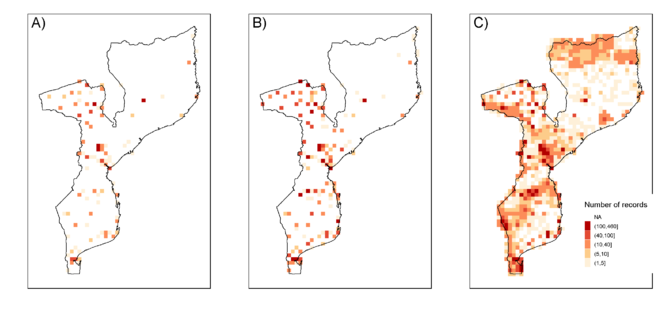|
Biodiversity Information Science and Standards : Conference Abstract
|
|
Corresponding author: Isabel Queirós Neves (i.queirosneves@gmail.com)
Received: 10 Jun 2019 | Published: 13 Jun 2019
© 2019 Isabel Neves, Maria da Luz Mathias, Cristiane Bastos-Silveira
This is an open access article distributed under the terms of the Creative Commons Attribution License (CC BY 4.0), which permits unrestricted use, distribution, and reproduction in any medium, provided the original author and source are credited.
Citation: Neves I, Mathias M, Bastos-Silveira C (2019) Mapping the Impact of Digitisation for Poorly Documented Countries: Mozambique as a case study. Biodiversity Information Science and Standards 3: e37025. https://doi.org/10.3897/biss.3.37025
|
|
Abstract
Despite the rise of the global availability of biodiversity data by digitisation, essential regions of the world remain poorly documented (
Aiming to aggregate a comprehensive dataset of Mozambique’s terrestrial mammals, we compiled primary species occurrence data from dispersed data sources. The produced dataset not only gathered digitalised accessible knowledge (DAK) from the Global Biodiversity Information Facility (GBIF) and natural history collections, but also retrieved and digitalised species occurrence data enclosed in grey and scientific literature.
Particularly for poorly documented countries, filling data gaps are crucial for new and broad insights for biodiversity research and preservation. Thus, quantification of the effects of data digitisation and mobilisation goes beyond the specific goals of organisations, institutions or data-sharing resources. The impact of data digitisation should be disseminated, not only by the number of publications and times data are accessed (
More than 17000 records were compiled. The digitisation of data in literature as well as data cleaning and quality improvements resulted in a substantial increase in the amount of DAK, which acknowledges Mozambique’s high species diversity (Fig.
Mapping the knowledge gain while compiling primary species occurrence data regarding terrestrial mammals reported for Mozambique. Spatial visualisation of A) ready-to-use digitally accessible data from online resources and natural history collections; B) digital data available after quality updates, namely after georeferencing and taxonomic verification; and C) data available after digitisation of grey and scientific literature.
The dataset compiled is an important "stepping stone" towards an enhanced knowledge of Mozambique’s fauna. Biodiversity conservation and management in developing countries rich in natural resources, which often must deal with a lack of internal capacity for applied research and conservation actions, are challenges. Considering that digitisation and mobilisation of biodiversity data are resourceful processes for improving knowledge, collaborative work between institutions of those countries and international data-provider communities could, in the short term, successfully improve the information baseline to support decision-making in future conservation and management actions.
Keywords
species-occurrence data, Africa, mammals, natural history collections, knowledge gap
Presenting author
Isabel Queirós Neves
Presented at
Biodiversity_Next 2019
References
-
Open access and biodiversity conservation: challenges and potentials for the developing world.Data Science Journal5:1‑17. https://doi.org/10.2481/dsj.5.1
-
The history and impact of digitization and digital data mobilization on biodiversity research.Philosophical Transactions of the Royal Society B: Biological Sciences374(1763). https://doi.org/10.1098/rstb.2017.0391
-
The terrestrial mammals of Mozambique: integrating dispersed biodiversity data.Bothalia48(1). https://doi.org/10.4102/abc.v48i1.2330
-
A global perspective on decadal challenges and priorities in biodiversity informatics.BMC Ecology15(1). https://doi.org/10.1186/s12898-015-0046-8
